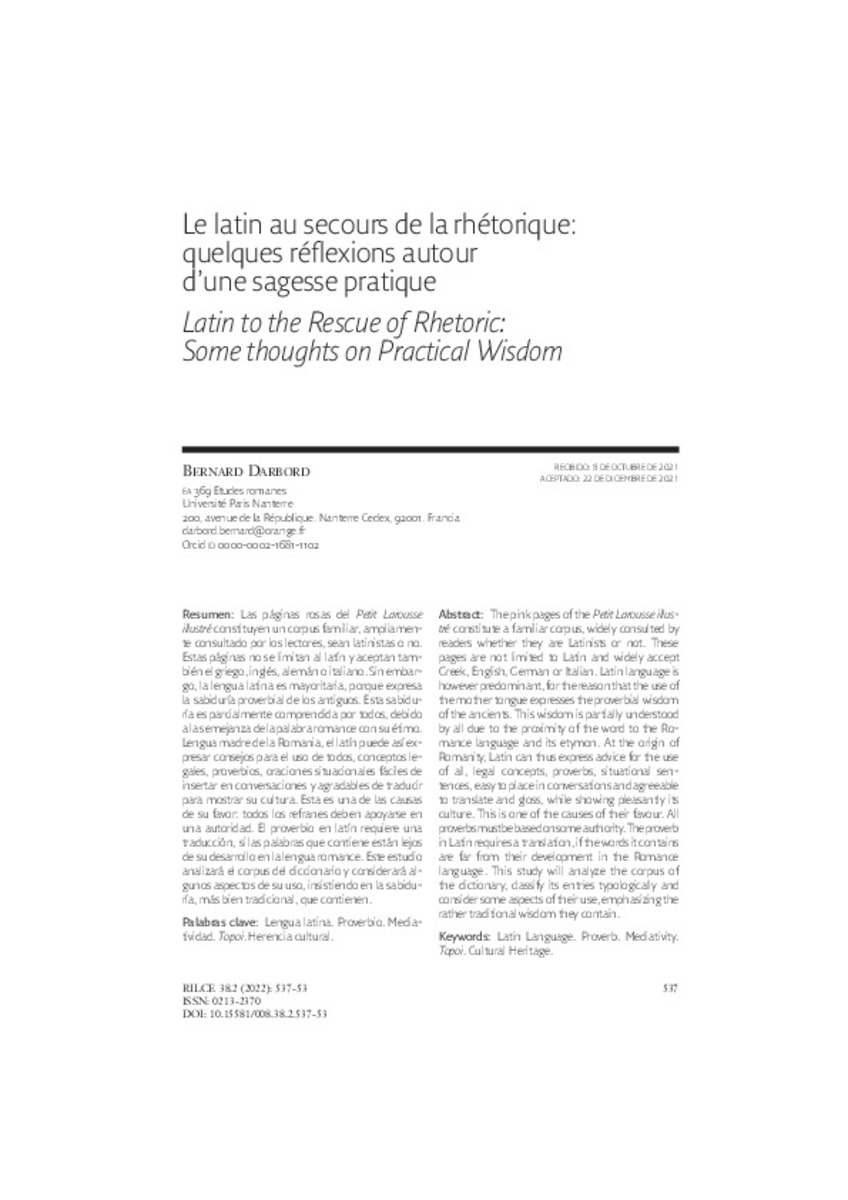Full metadata record
| DC Field | Value | Language |
|---|---|---|
| dc.creator | Darbord, B. (Bernard) | - |
| dc.date.accessioned | 2022-06-17 | - |
| dc.date.accessioned | 2023-02-09T06:55:40Z | - |
| dc.date.available | 2023-02-09T06:55:40Z | - |
| dc.date.issued | 2022 | - |
| dc.identifier.citation | Darbord, B. (Bernard). "Le latin au secours de la rhétorique: quelques réflexions autour d’une sagesse pratique". Rilce. Revista de Filología Hispánica. 38 (2), 2022, 537 - 53 | es |
| dc.identifier.issn | 2174-0917 | - |
| dc.identifier.uri | https://hdl.handle.net/10171/65365 | - |
| dc.description.abstract | The pink pages of the <em>Petit Larousse illustré </em>constitute a familiar corpus, widely consulted by readers whether they are Latinists or not. These pages are not limited to Latin and widely accept Greek, English, German or Italian. Latin language is however predominant, for the reason that the use of the mother tongue expresses the proverbial wisdom of the ancients. This wisdom is partially understood by all due to the proximity of the word to the Romance language and its etymon. At the origin of Romanity, Latin can thus express advice for the use of all, legal concepts, proverbs, situational sentences, easy to place in conversations and agreeable to translate and gloss, while showing pleasantly its culture. This is one of the causes of their favour. All proverbs must be based on some authority. The proverb in Latin requires a translation, if the words it contains are far from their development in the Romance language. This study will analyze the corpus of the dictionary, classify its entries typologically and consider some aspects of their use, emphasizing the rather traditional wisdom they contain. | en_US |
| dc.description.abstract | Las páginas rosas del <em>Petit Larousse illustré </em>constituyen un corpus familiar, ampliamente consultado por los lectores, sean latinistas o no. Estas páginas no se limitan al latín y aceptan también el griego, inglés, alemán o italiano. Sin embargo, la lengua latina es mayoritaria, porque expresa la sabiduría proverbial de los antiguos. Esta sabiduría es parcialmente comprendida por todos, debido a la semejanza de la palabra romance con su étimo. Lengua madre de la Romania, el latín puede así expresar consejos para el uso de todos, conceptos legales, proverbios, oraciones situacionales fáciles de insertar en conversaciones y agradables de traducir para mostrar su cultura. Esta es una de las causas de su favor: todos los refranes deben apoyarse en una autoridad. El proverbio en latín requiere una traducción, si las palabras que contiene están lejos de su desarrollo en la lengua romance. Este estudio analizará el corpus del diccionario y considerará algunos aspectos de su uso, insistiendo en la sabiduría, más bien tradicional, que contienen. | es_ES |
| dc.language.iso | fr | - |
| dc.publisher | Servicio de Publicaciones de la Universidad de Navarra | es_ES |
| dc.rights | info:eu-repo/semantics/openAccess | es_ES |
| dc.subject | Lengua latina | - |
| dc.subject | Proverbio | - |
| dc.subject | Mediatividad | - |
| dc.subject | Topoi | - |
| dc.subject | Herencia cultural | - |
| dc.title | Le latin au secours de la rhétorique: quelques réflexions autour d’une sagesse pratique | fr_FR |
| dc.type | info:eu-repo/semantics/article | es_ES |
| dc.identifier.doi | 10.15581/008.38.2.537-53 | - |
| dadun.citation.endingPage | 53 | - |
| dadun.citation.number | 2 | - |
| dadun.citation.publicationName | Rilce. Revista de Filología Hispánica | - |
| dadun.citation.startingPage | 537 | - |
| dadun.citation.volume | 38 | - |
Files in This Item:
Statistics and impact
Items in Dadun are protected by copyright, with all rights reserved, unless otherwise indicated.






